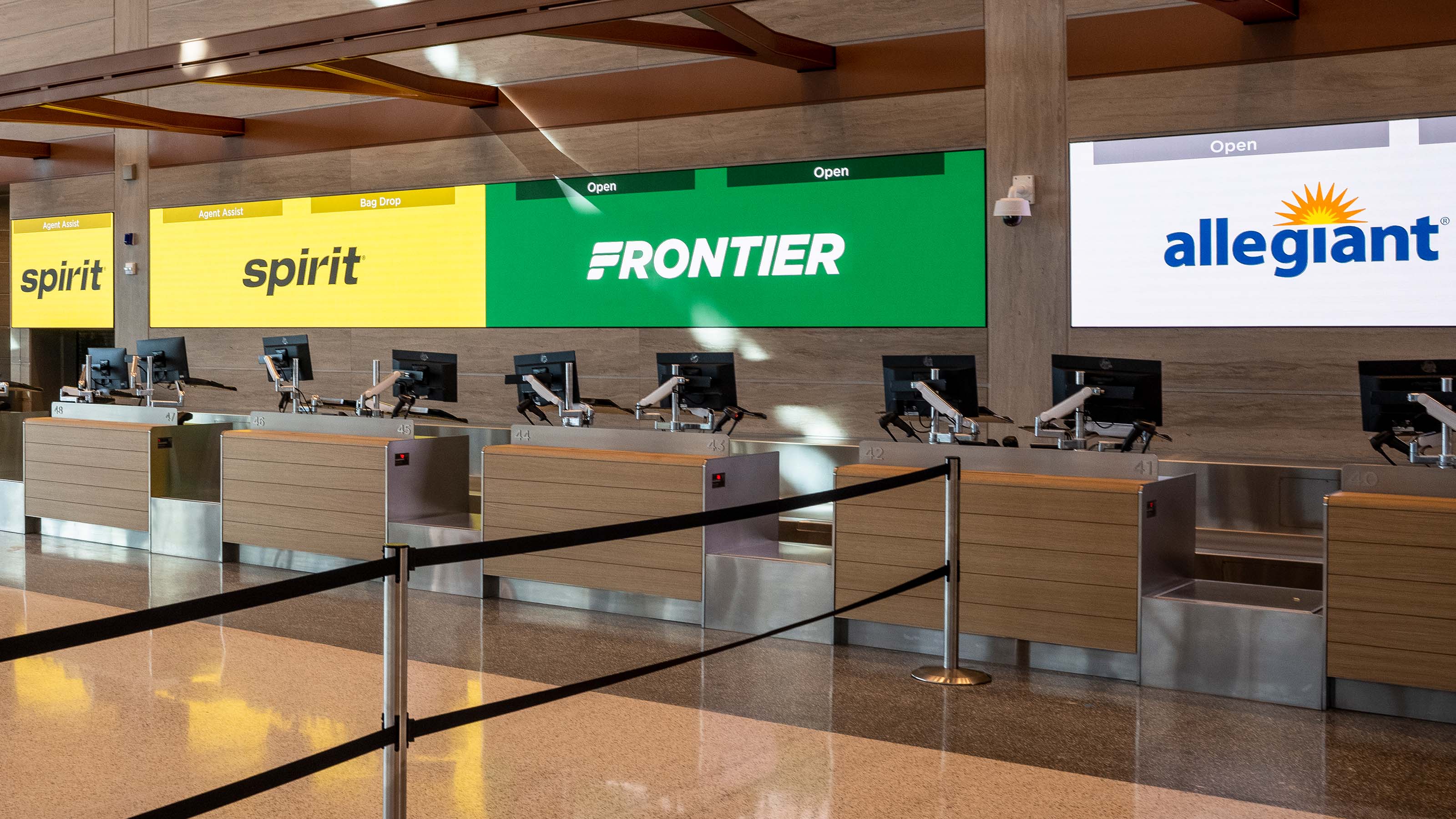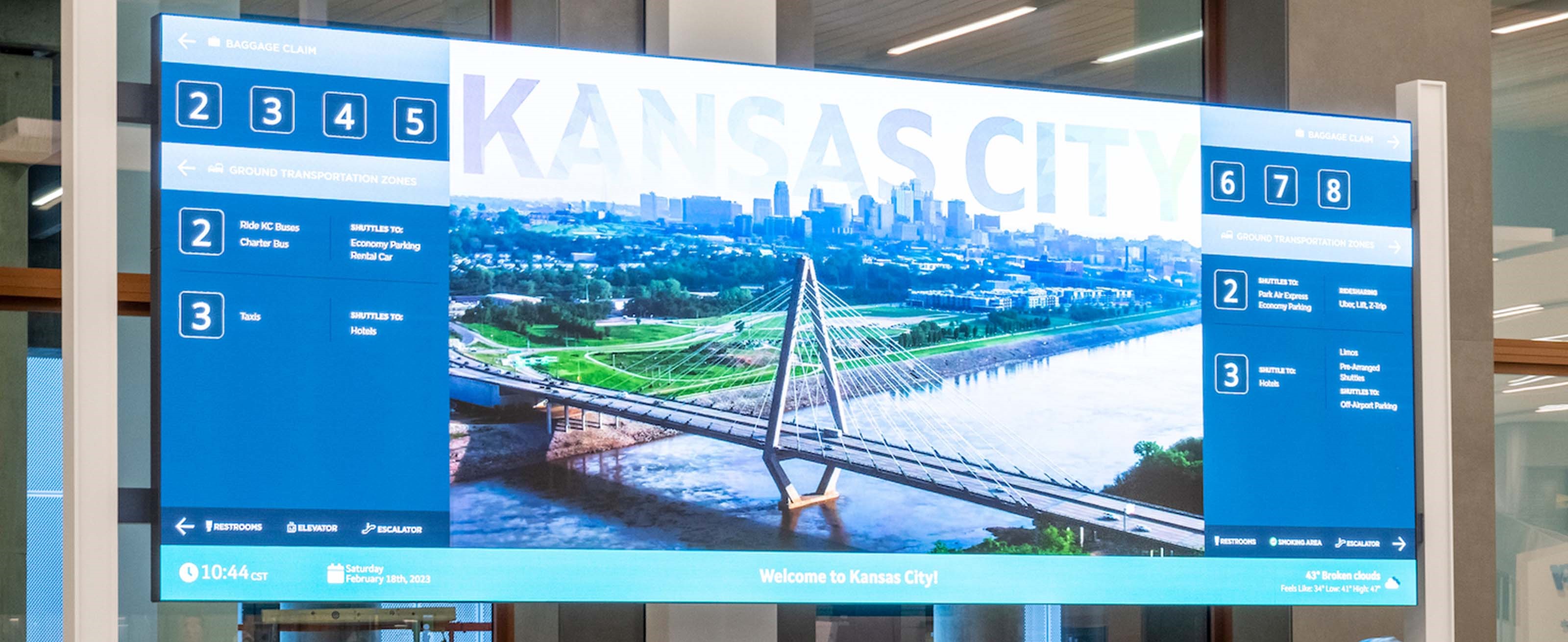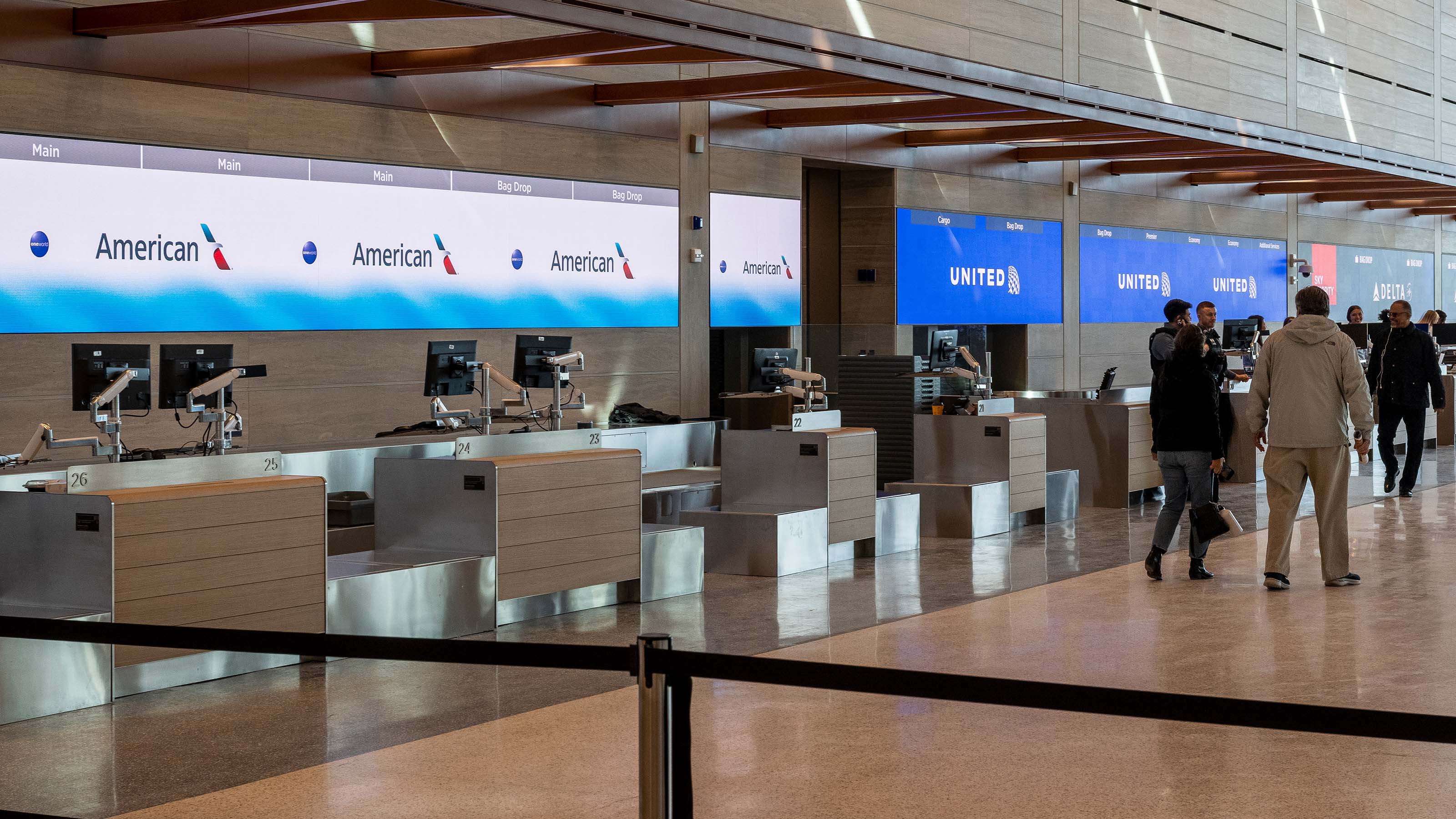
Opened on Feb. 28, the new terminal at Kansas City International Airport (KCI) is gaining rave reviews. Part of what makes this terminal so futuristic is a Nanolumens Nixel Series dvLED video wall with 2.5mm pixel pitch that spans the airport check-in counter area. With more than 18 million pixels, the backwall includes 15 separate displays in seven different sizes to make up one large digital canvas.
[Nanolumens, PSNI Global Alliance Partner with Focus on LED Applications]
The backwall provides check-in and drop-off agents with the ability to boldly display airline logos, lane queuing, and flight information data, plus update any other vital information as needed. A smaller Nanolumens Nixel Series 1.5mm dvLED video display, which measures almost 15 feet long and more than 5 feet tall, is positioned in the Arrivals area at the information desk.
“The architect and interior design teams were clear in their desire to have the backwall displays be a very specific size in order to fit their ticket counter plans and aesthetic,” said Geoff Berkeley, South Central regional sales manager, Nanolumens. “They were looking to have these displays fit flush to the wall but also into a particular size opening. A standard LED cabinet solution was not going to be able to meet their needs. Our Nanolumens Nixel Series can be completely customized to fit specific size requirements to provide for the design team’s intentions.”
Meanwhile, curbside arrival signage was provided by Nanolumens in partnership with Sign Resource. Ten 5.9mm Performance Series double-sided displays, measuring almost 6 feet wide and more than 3 feet tall, were also installed on posts to direct travelers to the correct airline’s check-in location.

All interior displays were installed by Dimensional Innovations of Overland Park, KS. In addition to the Nanolumens displays, the company provided three tvONE Green Hippo Boreal+ MK2 media servers to drive video content to both internal areas. The primary server delivers content to the ticket backwalls and Arrivals info desk displays. A second system is on standby as a backup to the primary server for the backwall, while a third is on backup for the info desk.
Flexible Approach
To put it mildly, the ticketing area's backwall signage is big, spanning the entire length of the ticketing counters of the airport terminal. The backwall is physically broken into seven sections by vertical pillars in the ticketing counter area, although electronically they function as a single, 102-foot display. This requires the Green Hippo Boreal+ MK2 server to serve specific areas of the video wall with different "status messages" (content) all at the same time.
[Why dvLED Is Gaining Market Share]
“The content shown is a mix of airline branding as well as customizable banners to denote the different functions of ticketing stations," explained Chris Riebschlager, director of creative technology with Dimensional Innovations. "We used the TouchDesigner plugin to render these status messages as a web page, which is then sliced up with tvONE’s Hippotizer VideoMapper and placed in each mix.”
The airline ticket counter staff can also trigger different presets in Hippotizer’s content management system. "A locally hosted web service relays these content management system changes to Hippotizer over the REST API interface, which we are taking full advantage of,” Riebschlager added.
Dimensional Innovations’ selection of integrated, computer-driven digital signs, rather than separate monitors provisioned by each individual airline, was made to provide KCI with the most flexible signage solution possible. “In an effort to make this space functional and customizable, an LED wall solution was chosen to future-proof this area and enable it to be updated and modified as necessary,” said Riebschlager.

The choice of dvLED video walls for this space was also very deliberate. “Direct-view LED was specified to fit architectural parameters of the facility and provide current tech/longevity for their new terminal,” said Scott Kehoe, tvONE’s regional manager.
“What we’re seeing here is the use of direct-view LED technology as a dynamic material finish in an environment designed and built around the need for dynamic messaging capability, as opposed to the more typical scenario where display technologies are added after the primary design is complete,” said Dan Rossborough, director of strategic projects, Nanolumens Special Projects Group. “The outcome can be witnessed as an intentional and aesthetically flawless agglomeration of static and dynamic surfaces.”
A desire for content flexibility drove the decision to use tvONE media servers and software. “The Green Hippo servers provide the playback of pre-rendered content as well as compositing the customizable banners above the video content,” Riebschlager explained. “The Green Hippo provides four 4K outputs, which are routed with the Nanolumens video hardware to the appropriate screen segments.”
“The three Boreal+ MK2 servers are providing playback of content being triggered by airport staff,” noted Kehoe. “Each Boreal+ MK2 server comes standard with two 10Gb NICs [network interface controllers]. An additional 10Gb NIC card was added to each server for additional data transfer. "Also, the bundled Hippotizer software incorporates TouchDesigner, which allows content to be overlaid on the screens. The Green Hippo server configuration for this application is quite capable of delivering additional performance as the demand for visual content becomes more sophisticated.”
Minimal Challenges
By its sheer scale, the KCI digital signage project would seem to be daunting by nature. However, the actual installation was far less challenging than one might have expected.
“Initially, airport data integration and content requirements were two unknowns, as not much information was defined,” Kehoe said. “But as the project came to fruition, the flexibility and capability of the Hippotizer software enabled the integration team to adapt gracefully. Feedback about the system has been nothing short of fantastic.”
“This was our first Green Hippo installation, so there was a slight learning curve,” added Riebschlager. “But with some help from the Green Hippo team, we were able to quickly ramp up the system and have it perform precisely how we needed it to.”
[Louisville Muhammad Ali Airport Strives to Be ‘The Greatest’ with AtlasIED]
It helps that Nanolumens knows the airport market very well. “We understand the high level of coordination and critical nature of these environments in which our displays need to perform,” said Todd Alan Green, global manager of airports and transportation, Nanolumens. “We provided a very high level of experience to the project team, which helped to minimize the risk involved in bringing these critical facilities to completion. At the end of the day, our goal is to help our clients deliver the best customer experience."
Today, the digital signage system is on duty 24/7 at the new terminal and working as planned, which is important because "it's such a crucial element to travelers coming through KCI,” Riebschlager said. “The integration with a content management system we created allows the airport to change messaging on the fly, offering much-needed flexibility with delivery and customization.”







